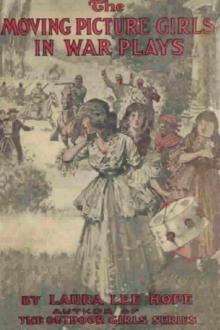An Island Story by H. E. Marshall (ebook pc reader .TXT) 📖

- Author: H. E. Marshall
- Performer: -
Book online «An Island Story by H. E. Marshall (ebook pc reader .TXT) 📖». Author H. E. Marshall
But even the Norman nobles were not pleased with their new king. The Conqueror had ruled them with an iron hand, and they had hoped, when he was dead, to have some one who would be less severe. They wanted Robert, the eldest son of William the conqueror, because they knew that he was much less harsh than William, and they thought that they would be able to do what they liked if Robert were king. So they rebelled against William the Red and asked Robert to come to England to fight for the crown.
Now the English hated to have a Norman king, but they hated the Norman nobles even more. Although William the Red was Norman he had lived in England ever since he had been about six years old. He could speak English, which the Conqueror could never learn to do, and which the Confessor had never cared to do.
So William the Red appealed to the English people. He said to them, “If you stand by me and fight for me, I will reward you. I will take away some of the heavy taxes, I will give you more liberty, and I will not allow the Norman barons to oppress you.”
So the English people fought for their Norman king, and they beat the Norman nobles. Robert was obliged to fly back to France, and William the Red with help of the English people, sat safely on the English throne.
But as soon as he was safe, William forgot about his promises. He oppressed the people as much as ever, and they were almost more unhappy than they had been in the time of his father.
The Red King was wicked and greedy. He stole money from every one, even from the churches, and spent it on his own pleasure. Little good can be said of him except that he was fearless. Still when he was ill, and thought he might die, he became frightened because of the wicked things he had done, and promised to do better. But as soon as he was well again he forgot his fears and was as wicked as before. He was not truly a brave man, and he was very cruel.
One day William the Red went to hunt with his friends in the New Forest—that forest which his father had made by destroying so many villages. Before the hunting-party started, a man came to the King and gave him six beautiful new arrows. The King admired them very much and he gave one of them to his friend, Walter Tyrrell, who was a very good shot, saying. “The best arrows should be given to him who knows best how to use them.”
It was a gay scene. The King in his rich hunting-dress rode first. His friends and servants, gayly dressed, followed. There was much talking and laughing and barking of dogs.
As they rode into the forest, the frightened deer fled before them, and soon every one was eagerly following the chase. In the many paths of the forest, the King became separated from his friends. The nobles did not notice that the King was not among them, for it often happened in hunting that a few would be separated from the others. When the hunt was over, one by one the hunting-party returned to the palace. Only the King did not return—the King and one noble, Walter Tyrrell.
What had happened?
As the shadows began to lengthen and the sun to set, the people of his household became uneasy. Who was with the King? Who saw him last?
As the question was asked, a peasant’s cart came slowly up the street. It was a rough wooden cart drawn by an old white horse, led by a peasant in poor and shabby clothes.
The question was answered. In the cart the King, who so short a time before had ridden gayly away, lay dead, with an arrow through his heart.
“Who has done this?” asked the barons, seizing the peasant. “Villain, answer.”
“I know naught of it, my lords,” replied the man. “I was passing through the forest on my way home when I found this man lying dead as you see him. I bethought me that it was the King, so I brought him thither.”
How William the Red was killed can never be known. Some people say that Walter Tyrrell, while aiming at a deer, hit the king by mistake, that the arrow struck a tree and glancing off, pierced the king in the breast and killed him. These people think that Walter Tyrrell, frightened at what he had done, fled away as fast as he could; that he fled to the seashore, got into a ship and sailed over to France.
Certain it is that Walter Tyrrell did run away that day, and did not return to England for many years. But when he came back, he vowed very solemnly that he had not done the deed and that he had not even been near the King that day when he died.
There was no sorrow for the dead king. He was hated so much that, when he was buried, no bell was rung, no prayers were said, and when some time after the tower of the church fell, people said it was because of the wickedness of William, the Red King, who lay buried there.
HENRY I.—THE STORY OF THE “WHITE SHIP”
WILLIAM THE RED died in 1100 A.D. He had no children, so his brother Henry became king after him. Henry was the youngest son of William the Conqueror. He was fond of learning and could read and write better than most people in those days, so he was called Beauclerc, which is French and means “fine scholar.”
Henry’s eldest brother Robert, Duke of Normandy, was still alive, and the Norman barons in England still wanted to have him for their king. So they sent over to France and asked Robert to come to fight again for the crown.
Once more the English people had to choose between the Norman king and the Norman barons. Once more they decided for the King and fought for him, even although William the Red had forgotten his promises and cruelly deceived them. For although Henry’s father and mother had been Norman, Henry himself had been born in England, and the English people felt as if that almost made him English. So once more they chose to fight for the King against the barons.
Henry Beauclerc did not repay the people with promises only, as his brother had done. He gave them a written letter, or charter as it was called, in which he promised to do away with many of William the Red’s cruel laws, to restore the good laws of Edward, and to lessen the power of the barons.
Later on another king gave the people a much more important charter, but in the meantime the English were very glad to get this one.
Besides giving them this charter, Henry pleased the English very much by marrying the Scottish Princess Maud, or Matilda as she was sometimes called.
Edgar the �theling had a sister named Margaret. She married the Scottish King Malcolm III., and this Princess Maud was their daughter, and the great-granddaughter of Edmund Ironside. When Henry married her and she became Queen of England, the English felt that the crown had come back again to their own people, and they were very glad. But the Norman nobles were angry about it. They thought Henry ought to have married a Norman lady.
Although many of the nobles were angry, Henry’s marriage did a great deal of good, for other Normans followed the King’s example and married English ladies so that the hatred between the two races began to disappear a little.
Thus it happened that when Robert and his barons came to fight Henry, they were met by an army of English, whose hearts were with their king and who “nowise feared the Normans.” So hopeless did Robert feel it to be, that he made peace with his brother and went back to Normandy without fighting.
Then Henry punished the rebel barons by taking their lands away from many of them and banishing others. The English helped him and rejoiced at the defeat of the proud barons.
Later on Robert and Henry quarreled again. Henry sailed over to Normandy with an army of English soldiers, defeated his brother, and took possession of Normandy. So now instead of England belonging to Normandy, Normandy belonged to England.
When Henry had been king for about twenty years a great and terrible grief came upon him. He and his son, Prince William, had been in Normandy together. Just as they were ready to return to England, a sailor came and begged Henry to honor him by using his ship. “My father Stephen,” he said, “steered the ship in which your father sailed over to England when he went to conquer Harold. My father was a good sailor, and he served King William until he died. I, too, am a sailor like my father. I have a beautiful boat called the White Ship. It is newly rigged and freshly painted, it is manned by fifty trusty sailors, and is in every way worthy of a king. Honor me, as your father honored my father, and give me leave to steer you to England.”
“I thank you, good Master FitzStephen,” said Henry, “but I have already made choice of the ship in which I intend to sail, and I cannot change. But,” he added, seeing the man looked disappointed, “my son, Prince William, is with me and you may steer him and his company over the channel.”
Thomas FitzStephen was very glad when he heard that, and he hurried away to tell his sailors to prepare to receive the prince.
Late in the afternoon King Henry set sail, leaving Prince William to follow in the White Ship. But Prince William was young and gay, and he did not feel inclined to start at once. He stayed on shore drinking and feasting and making merry with his friends. When at last he did go on board, he ordered the captain to give the sailors three barrels of good red wine with which to drink his health. So there was still further delay. As was usual in those days, priests came to bless the ship before it started, but the prince and his gay companions laughed at them, and the sailors, whom the wine had made merry, chased them away.
One of the King’s friends, who had been left behind with the prince, now urged the captain to start. “Oh, there is no hurry,” said FitzStephen, “my beautiful White Ship has sails like the wings of a bird. She skims over the water swifter than a swallow. We can easily overtake the King and be in England before him.”
At last they started. The deck was crowded with fine ladies and gay gentlemen. These ladies and gentlemen had many servants, so that, together with the sailors, there were about three hundred people on board the ship.
The sails were set, the sailors bent to the oars, and to the sound of song and laughter the gay ship left the harbor, skimming over the waves like a beautiful bird, as the captain had said.
It was a clear and frosty winter’s evening. The red sun had sunk and a silver moon shone brightly. All was merriment and laughter when, suddenly, there was an awful crash. The ship seemed to shiver from end to end and then stand still. The next minute





Comments (0)